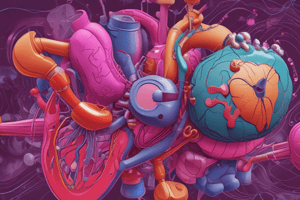Podcast
Questions and Answers
Why is the liver susceptible to injury?
Why is the liver susceptible to injury?
- The liver has low levels of xenobiotic metabolizing enzymes.
- Most reactions in the liver are detoxification reactions, preventing damage.
- The liver is rich in metabolizing enzymes, which can produce damaging reactive metabolites. (correct)
- The liver is the last organ perfused by chemicals after absorption.
What determines the types of liver injury?
What determines the types of liver injury?
- Toxic agent only
- Severity of intoxication only
- Type of exposure only
- Toxic agent, severity of intoxication, and type of exposure (correct)
How do organs differ in their response to toxicants?
How do organs differ in their response to toxicants?
- All organs are equally affected by toxicants.
- Toxicants affect all organs the same way due to lipid content.
- Organs differ in cell structures, chemical features, and toxicant effects. (correct)
- Organs have similar cell structures and features.
What is target organ toxicity in toxicology?
What is target organ toxicity in toxicology?
What is a characteristic symptom of cadmium toxicity described in the text?
What is a characteristic symptom of cadmium toxicity described in the text?
How do aminoglycosides like streptomycin and gentamycin cause tissue necrosis in the kidneys?
How do aminoglycosides like streptomycin and gentamycin cause tissue necrosis in the kidneys?
What mechanism does amphotericin B use to induce kidney damage?
What mechanism does amphotericin B use to induce kidney damage?
How does cardiotoxicity impact cardiac muscle function?
How does cardiotoxicity impact cardiac muscle function?
Which mechanism of cardiotoxicity involves interference with the membrane control of ionic movement?
Which mechanism of cardiotoxicity involves interference with the membrane control of ionic movement?
Which toxicant is known for causing hyperkalemia and subsequent arrhythmias due to increased automaticity?
Which toxicant is known for causing hyperkalemia and subsequent arrhythmias due to increased automaticity?
What is a characteristic effect of toxicants that cause direct damage to the myocardium?
What is a characteristic effect of toxicants that cause direct damage to the myocardium?
Which toxicant is associated with myocardial necrosis due to interference with oxygen availability?
Which toxicant is associated with myocardial necrosis due to interference with oxygen availability?
What is the mechanism of action of Trastuzumab in the heart?
What is the mechanism of action of Trastuzumab in the heart?
What is the role of HER-2 receptors in the heart under stress conditions?
What is the role of HER-2 receptors in the heart under stress conditions?
How do toxicants cause demyelination in neurons?
How do toxicants cause demyelination in neurons?
What role does myelin play in nerve signals?
What role does myelin play in nerve signals?
Flashcards are hidden until you start studying





